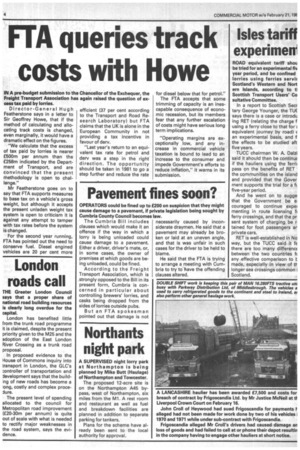• FTA queries track costs with Howe
Page 6

If you've noticed an error in this article please click here to report it so we can fix it.
IN A pre-budget submission to the Freight Transport Association has cess tax paid by lorries.
Director-General Hugh Featherstone says in a letter to Sir Geoffrey Howe, that if the method of calculating and allocating track costs is changed, even marginally, it would have a dramatic effect on the figures.
"We calculate that the excess of tax paid by lorries is nearer £500m per annum than the • £258m indicated by the Department of Transport, and are convinced that the present methodology is open to challenge."
Mr Featherstone goes on to say that FTA supports measures to base tax on a vehicle's gross weight, but although it accepts the present unladen weight tax system is open to criticism it is against any attempt to tamper with tax rates before the system is changed.
For the second year running, FTA has pointed out the need to conserve fuel. Diesel engined vehicles are 20 per cent more Chancellor of the Exchequer, the again raised the question of ex efficient (37 per cent according to the Transport and Road Research Laboratory) but FTA claims that the UK is alone in the European Community in not providing a tax incentive in favour of derv.
"Last year's return to an equivalent tax rate for petrol and dery was a step in the right direction. The opportunity should be taken in 1981 to go a step further and reduce the rate for diesel below that for petrol."
The FTA accepts that some trimming of capacity is an inescapable consequence of economic recession, but its members fear that any further escalation of costs might have serious long term implications.
"Operating margins are exceptionally low, and any increase in commercial vehicle taxation is bound to lead to an increase to the consumer and impede Government's efforts to reduce inflation," it warns in its submission.
































































































